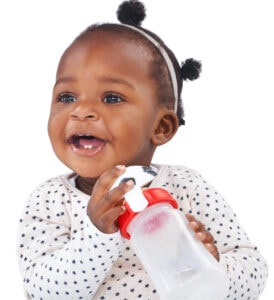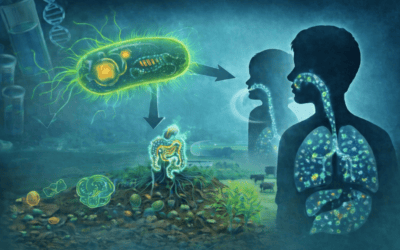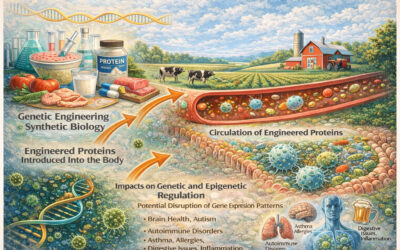Article 5 in the Got Real Milk Series
Time to Rock and Roll: Get the Lead Out!
We are at the fork in the road — do we really want to protect our children or are we at an attitude of platitude?
The Infant Formula Toxic Metal Study Getting Press
 Moms Across America, The New MDS, and GMOScience, banded together and did the work of regulatory agencies. We’ve confirmed what officials already knew; infant formula, the only food for many babies, is contaminated and it has been given a pass.
Moms Across America, The New MDS, and GMOScience, banded together and did the work of regulatory agencies. We’ve confirmed what officials already knew; infant formula, the only food for many babies, is contaminated and it has been given a pass.
However, this David and Goliath tale has not gone unnoticed and has been picked up by global news agencies, including Dr. Mercola, The Exposé, Children’s Health Defense, and The Townsend Letter. Additionally, the FDA has made recommendations to Congress regarding the Safe Baby Food Act based on our joint meeting regarding our findings in May 2024.
Millions of parents are now becoming aware of the toxic metal contamination in the formulas that they are feeding their most vulnerable and immediate action must occur to rectify this situation.
How Do We Manifest a Solutions-Based Change?
The mission of GMOScience is Educate to Regenerate: Our focus is on solutions that promote food as medicine with a focus on individual and environmental well-being based on non-biased science.
Here are a few ideas from this pediatrician on how to “Get the Lead Out”:
Source Raw Ingredients Carefully:
- Select raw ingredients from suppliers that adhere to strict quality control and environmental standards, including organic/regenerative sourcing.
- Choose ingredients sourced from regions with low environmental contamination.
- Acknowledge/reward suppliers that adhere to these standards, particularly for baby formula/infant foods.
- Create a subsidized program for dairy farmers that switch to organic/regenerative practices that supply infant formula manufacturers.
Implement Rigorous Testing:
- Test all raw materials for toxic metals and other contaminants such as pesticides, solvents, and plastics before they enter the production process.
- Use certified laboratories and standardized testing methods, such as Inductively Coupled Plasma Mass Spectrometry (ICP-MS).
Use High-Quality Water:
- Employ purified, filtered, and tested water in the production process to avoid introducing contaminants.
- Regularly test the water supply for toxic metals and other pollutants.
Adopt Clean Manufacturing Practices:
- Maintain a clean and controlled manufacturing environment to prevent cross-contamination. Employ non-toxic sanitization methods to avoid toxicity from cleaning products.
- Regularly inspect and clean machinery and equipment used in the production process.
- Confer with experts in Environmental Medicine for assistance.
Incorporate Advanced Filtration Techniques:
- Utilize advanced filtration and purification technologies, such as reverse osmosis and activated carbon filters, to remove contaminants during production.
Conduct Batch Testing:
- Test each batch of the final product for toxic metals and toxic substances before distribution.
- Implement a rigorous quality assurance protocol to ensure each batch meets safety standards. This standardized process should be adhered to by every formula company.
Adhere to Regulatory Standards:
- Comply with national and international regulatory standards for infant formula safety.
- Stay updated with the latest guidelines from authorities such as the FDA, EFSA, and Codex Alimentarius.
- Offer quality products to families receiving governmental assistance such as WIC (Women, Infants, and Children).
Implement Continuous Monitoring and Improvement:
- Establish a system for continuous monitoring of contamination risks and improvements in production processes.
- Conduct regular audits and reviews of the supply chain and manufacturing process.
Educate and Train Staff:
- Provide comprehensive training to staff on best practices for preventing contamination.
- Ensure ongoing education on the latest safety protocols and technological advancements in contaminant removal.
Communicate Transparently with Consumers:
- Provide clear information about the measures taken to ensure the safety of the infant formula.
- Offer transparency regarding testing results and safety certifications to build consumer trust.
- Formula companies would be responsible for providing SPEC sheets on the results of their toxicity testing easily accessible on their websites. This information would be provided in user-friendly language.
Parents shouldn’t need a PhD to feed their babies the best products available. And a pediatrician shouldn’t have to tell the FDA and formula companies how to do their job.
Clearly, breast milk is best for babies, and I applaud industry for trying to create the best substitute available. However, the goals have fallen short and immediate action is required to provide a quality product.
For parents looking to make their own formula, Dr. Mercola offers some suggestions on this process.
Thinking Outside the Infant Formula Box
Our research has uncovered two very disturbing findings that demand urgent attention. Many babies who are dairy intolerant are offered soy-based formula as an alternative. However, our testing has revealed that soy-based products are the most contaminated with toxic metals, posing significant health risks to vulnerable infants. This alarming discovery highlights the critical need to reassess the reliance on soy formulas for dairy-intolerant babies and to explore safer, more effective alternatives.
 Is it not possible to rethink dairy intolerance in terms of infant feeding? One promising approach is to offer babies A2 milk, which is less antigenic and easier to digest for those with dairy sensitivities while incorporating specific probiotics that break down lactose and convert it to beneficial lactic acid via microbial activity which can further enhance the digestibility of A2 milk. By integrating microbial enhancement into infant formulas, we can potentially eliminate the need for soy-based products, which have never been an adequate solution due to their allergenic potential and contamination risks.
Is it not possible to rethink dairy intolerance in terms of infant feeding? One promising approach is to offer babies A2 milk, which is less antigenic and easier to digest for those with dairy sensitivities while incorporating specific probiotics that break down lactose and convert it to beneficial lactic acid via microbial activity which can further enhance the digestibility of A2 milk. By integrating microbial enhancement into infant formulas, we can potentially eliminate the need for soy-based products, which have never been an adequate solution due to their allergenic potential and contamination risks.
Exploring innovative approaches such as the above suggestions opens up numerous possibilities to not only produce the next best food for infants who cannot receive breast milk, but also to ensure the highest quality and safety of ingredients. Moving towards a holistic way of producing formula involves embracing natural, minimally processed ingredients and leveraging the benefits of probiotics and other beneficial microbes.
This shift can lead to the development of superior infant formulas that support healthy growth and development while minimizing exposure to harmful contaminants. By prioritizing holistic production methods, we can provide infants with safer, more nutritious feeding options that align with the best practices in modern nutrition and food safety



